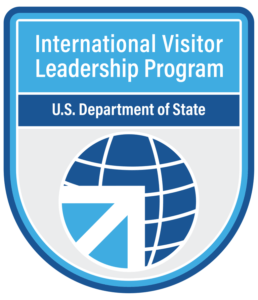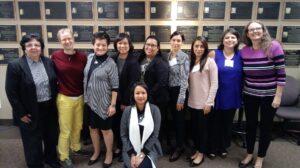 The International Visitor Leadership Program (IVLP) is the U.S. Department of State’s premier professional exchange program. Through short-term visits to the United States, current and emerging foreign leaders in a variety of fields experience this country firsthand and cultivate lasting relationships with their American counterparts.
The International Visitor Leadership Program (IVLP) is the U.S. Department of State’s premier professional exchange program. Through short-term visits to the United States, current and emerging foreign leaders in a variety of fields experience this country firsthand and cultivate lasting relationships with their American counterparts.
On October 12, U.S. Deputy Secretary of State John J. Sullivan welcomed the 2017 “Hidden No More” exchange program participants. 48 women leaders in science, technology, engineering, and math (STEM) came to the United States for the program, an IVLP that was inspired by screenings of the award-winning film Hidden Figures at more than 100 U.S. Embassies and Consulates worldwide as part of the American Film Showcase program.
Participants spent three weeks networking with professional counterparts and exploring policies that champion the interests of women in STEM in cities across the United States. Hidden No More aims to highlight and develop the important contribution of women and girls in STEM.
At the request of the United States State Department, the East Syracuse Minoa CSD STEM Learning Ecosystem and CNY STEM Hub were invited by The International Center of Syracuse to meet with a group of the IVLP leaders in STEM. Attendees included a Professor of Sustainable Development at the University of San Carlos in Guatemala, an expert in Electronics and Communications Engineering from Nepal, the Chief Technology Officer and Co-Founder of a Medical Company in Sweden, and a Science Education Specialist focused on Environmental Technology in Thailand.

The STEM Learning Ecosystems members discussed the AT&T CNY STEM Hub Summer Camp that was held at LeMoyne College this past summer. Highlights of this year’s camp included a computer coding course, a visit to the Syracuse Hancock International Airport air traffic control tower, and drone demonstrations from the Syracuse Academy of Model Aeronautics.
According to Dr. Donna DeSiato, Superintendent, East Syracuse Minoa CSD and Lead for East Syracuse Minoa CSD STEM Learning Ecosystem, “These energizing conversations are cultivating global partnerships and expanding the boundaries of learning for student success in college, career, and life in our rapidly evolving world.”
STEM Ecosystems play a vital role in the expansion of education that extends opportunities to all students. Even as we witness the thriving exchange of ideas among Ecosystems in the United States, it’s exciting to see this collaboration extend around the world, with diverse leaders sharing strategies for engaging young women in STEM.

